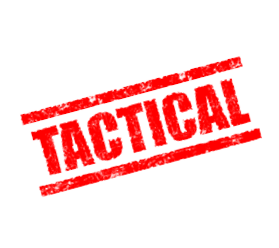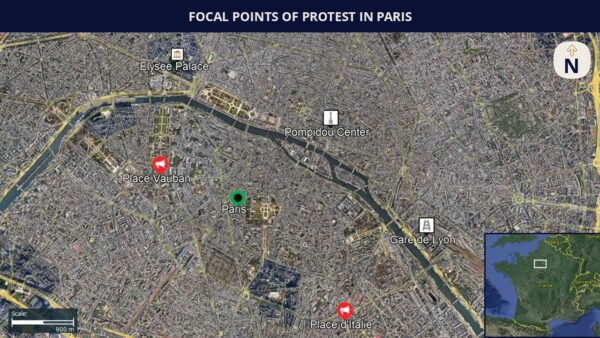30
Sep 2025
11:23 UTC
France Tactical: Nationwide labor strike, associated protests, scheduled on October 2; avoid nonessential travel
Current Situation
- An inter-union multisector national strike is scheduled to take place on October 2, with associated protests slated nationwide.
- The strike has been called to put pressure on the new Prime Minister, Sebastien Lecornu, to reverse or abandon the austerity program proposed by his predecessor.
- Unionized rail sector workers employed by Societe Nationale des Chemins de fer Francais (SNCF), France’s state-owned railway operator, will participate in the strike. Workers affiliated with the Confederation Generale du Travail (CGT) Cheminots, Union Nationale des Syndicats Autonomes Ferroviaire (UNSA-Ferroviaire), as well as several other rail unions, have been urged to “mobilize massively, through strikes and in the streets.”
- Reports indicate that the labor action will disrupt train service from 19:00 (local time) on October 1 until 08:00 on October 3. The TGV high-speed rail network, as well as regional and intercity services, will be affected.
- In Paris, public transport workers employed by the Regie autonome des transports parisiens (RATP) and associated with CGT, Force Ouvriere (FO), Union nationale des syndicats autonomes – Mobilite (UNSA-Mobilite), and Confederation francaise de l’encadrement – Confederation generale des cadres (CFE-CGC) will strike.
- Unions representing primary and secondary school teachers have announced their intention to join the strike, with schools expected to close or operate with reduced staff nationwide.
- The healthcare sector will also be affected, with CGT sante-sociaux called to strike. Furthermore, while having joined the September 10 and 18 strike actions, pharmaceutical unions have announced they will not participate in the October 2 strike.
- Unionized postal and telecommunications workers associated with CGT des salaries des activites postales et de telecommunications will participate.
- Potential disruptions are expected in other public sector services, though the extent will vary regionally.
- Hundreds of demonstrations are expected to be organized in France. Information regarding protest locations nationwide can be found here (in French).
- In Paris, a protest march is slated to take place from Place d’Italie to Place Vauban from 14:00.
Source: FSU
Assessments & Forecast
- Based on precedent and the mobilization capacity of the groups involved, total nationwide turnout is expected in the mid to high hundreds of thousands. This is also supported by turnouts on September 10 and 18, which saw over 200,000 and 500,000 people protest, respectively. In Paris, the protest will likely see a turnout in the mid-tens-of-thousands. Protests in other cities are likely to see turnouts varying from low thousands to low tens of thousands.
- With riots and unrest recorded during the September 10 and September 18 protests, these demonstrations carry an elevated threat of violent unrest. Unrest is likely to manifest in the form of clashes between activists and police, particularly in urban areas and at transport hubs. Moreover, the far-left La France Insoumise (LFI) party and the far-left movement “Bloquons tout” (“Block Everything”) are liable to support the labor action and attend or organize additional protests. This will further increase the risk of unrest, as it raises the possibility of radical far-left actors attending. Such unrest is likely to include vandalism of public and private property, arson, the use of projectiles, including incendiary devices, and temporary blockages of streets or transport infrastructure. Widespread unrest is also liable to trigger opportunistic criminal activity, including looting in commercial areas adjacent to demonstrations
- Given precedent and widespread support, the strike is expected to see high participation, with additional groups likely to join or stage walkouts on October 2. This is likely to result in supply-chain disruptions, especially given the expected impact on transportation.
- Severe disruptions to rail travel and public transportation, including last-minute cancellations and delays, are anticipated during the strike. With that, overcrowding on other available public transport services, like intercity buses, is likely to occur in areas experiencing significant travel disruptions. Additionally, traffic congestion on major motorways should be expected, as commuters resort to using personal vehicles.
- Additionally, given precedent, disruptions to education-related services can be expected nationwide on October 2. Considering potential school closures, disruptions to other sectors are likely, as parents will be required to look after children at home or seek alternative care.
- Regarding the healthcare sector, given that during the September 10 strike only seven percent of staff participated, only small, localized impacts are expected, mainly in non-essential units. In all cases, essential services are required to maintain a minimum level of service.
- Furthermore, disruptions are expected to affect postal deliveries and telecommunication services. Possible impacts include delayed mail and parcel deliveries, reduced availability of customer support, and temporary interruptions of certain telecom services.
Recommendations
- Those operating or residing in France on October 2 are advised to avoid nonessential travel near any labor action-related protests due to the elevated risk for violent unrest.
- Allot for disruptions in the vicinity of any protests or gatherings linked to the labor action.
- Allot for disruptions to travel, including railways; disruptions to supply chains; and disruptions to essential services, including postal and communication services.
COUNTRY RISK LEVEL
Low
AFFECTED AREA
France
INCIDENT RISK LEVEL
High
STRENGTH OF SOURCE
Confirmed
Current Situation
- An inter-union multisector national strike is scheduled to take place on October 2, with associated protests slated nationwide.
- The strike has been called to put pressure on the new Prime Minister, Sebastien Lecornu, to reverse or abandon the austerity program proposed by his predecessor.
- Unionized rail sector workers employed by Societe Nationale des Chemins de fer Francais (SNCF), France’s state-owned railway operator, will participate in the strike. Workers affiliated with the Confederation Generale du Travail (CGT) Cheminots, Union Nationale des Syndicats Autonomes Ferroviaire (UNSA-Ferroviaire), as well as several other rail unions, have been urged to “mobilize massively, through strikes and in the streets.”
- Reports indicate that the labor action will disrupt train service from 19:00 (local time) on October 1 until 08:00 on October 3. The TGV high-speed rail network, as well as regional and intercity services, will be affected.
- In Paris, public transport workers employed by the Regie autonome des transports parisiens (RATP) and associated with CGT, Force Ouvriere (FO), Union nationale des syndicats autonomes – Mobilite (UNSA-Mobilite), and Confederation francaise de l’encadrement – Confederation generale des cadres (CFE-CGC) will strike.
- Unions representing primary and secondary school teachers have announced their intention to join the strike, with schools expected to close or operate with reduced staff nationwide.
- The healthcare sector will also be affected, with CGT sante-sociaux called to strike. Furthermore, while having joined the September 10 and 18 strike actions, pharmaceutical unions have announced they will not participate in the October 2 strike.
- Unionized postal and telecommunications workers associated with CGT des salaries des activites postales et de telecommunications will participate.
- Potential disruptions are expected in other public sector services, though the extent will vary regionally.
- Hundreds of demonstrations are expected to be organized in France. Information regarding protest locations nationwide can be found here (in French).
- In Paris, a protest march is slated to take place from Place d’Italie to Place Vauban from 14:00.
Source: FSU
Assessments & Forecast
- Based on precedent and the mobilization capacity of the groups involved, total nationwide turnout is expected in the mid to high hundreds of thousands. This is also supported by turnouts on September 10 and 18, which saw over 200,000 and 500,000 people protest, respectively. In Paris, the protest will likely see a turnout in the mid-tens-of-thousands. Protests in other cities are likely to see turnouts varying from low thousands to low tens of thousands.
- With riots and unrest recorded during the September 10 and September 18 protests, these demonstrations carry an elevated threat of violent unrest. Unrest is likely to manifest in the form of clashes between activists and police, particularly in urban areas and at transport hubs. Moreover, the far-left La France Insoumise (LFI) party and the far-left movement “Bloquons tout” (“Block Everything”) are liable to support the labor action and attend or organize additional protests. This will further increase the risk of unrest, as it raises the possibility of radical far-left actors attending. Such unrest is likely to include vandalism of public and private property, arson, the use of projectiles, including incendiary devices, and temporary blockages of streets or transport infrastructure. Widespread unrest is also liable to trigger opportunistic criminal activity, including looting in commercial areas adjacent to demonstrations
- Given precedent and widespread support, the strike is expected to see high participation, with additional groups likely to join or stage walkouts on October 2. This is likely to result in supply-chain disruptions, especially given the expected impact on transportation.
- Severe disruptions to rail travel and public transportation, including last-minute cancellations and delays, are anticipated during the strike. With that, overcrowding on other available public transport services, like intercity buses, is likely to occur in areas experiencing significant travel disruptions. Additionally, traffic congestion on major motorways should be expected, as commuters resort to using personal vehicles.
- Additionally, given precedent, disruptions to education-related services can be expected nationwide on October 2. Considering potential school closures, disruptions to other sectors are likely, as parents will be required to look after children at home or seek alternative care.
- Regarding the healthcare sector, given that during the September 10 strike only seven percent of staff participated, only small, localized impacts are expected, mainly in non-essential units. In all cases, essential services are required to maintain a minimum level of service.
- Furthermore, disruptions are expected to affect postal deliveries and telecommunication services. Possible impacts include delayed mail and parcel deliveries, reduced availability of customer support, and temporary interruptions of certain telecom services.
Recommendations
- Those operating or residing in France on October 2 are advised to avoid nonessential travel near any labor action-related protests due to the elevated risk for violent unrest.
- Allot for disruptions in the vicinity of any protests or gatherings linked to the labor action.
- Allot for disruptions to travel, including railways; disruptions to supply chains; and disruptions to essential services, including postal and communication services.


